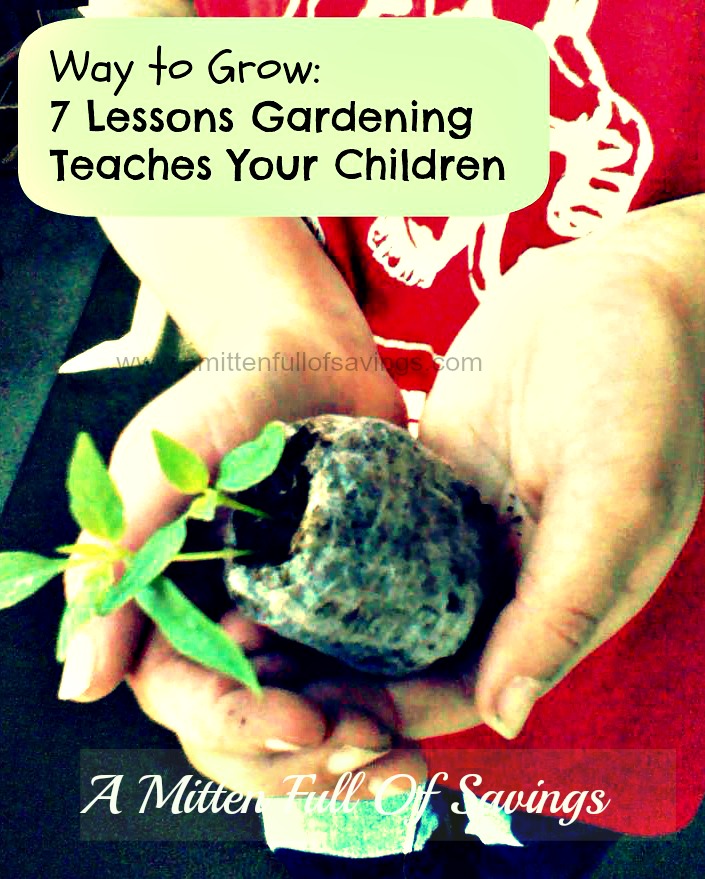7 Lessons Gardening Teaches Your Children
Gardening is about more than just growing plants, it is the perfect time to grow little minds and imaginations as well. If you have a backyard garden, or if you are considering planting one, you should know that it will do more than stretch your grocery budget. A backyard garden is also ideal for teaching your children some valuable lessons in a way that is fun and exciting, as well as hands on and entertaining! Perhaps you thought gardening was only fun for you as an adult, but in reality it can provide so much more. Below, you will find seven lessons gardening teaches your children. Just by spending time tending to a garden as a family, you will be amazed at what lessons may come forth.
Take a look at how easy it is to turn your garden not only into a source of produce, but a source of knowledge for your children.
7 Lessons Gardening Teaches Your Children:
1. . Planning is important.
You can just dig a hole and start throwing seeds in. You have to plan your garden ahead of time. Allow children to give input as far as what they want to see in the garden. Use the internet as a resource to help. By being prepared, you can plant a garden that best suits your needs. Give your child a notebook or scrap paper to start writing down ideas.
2. Too much of a good thing is harmful.
While plants needs water, fertilizer and sun, too much can be harmful. Over indulging can cause the plant to not thrive and eventually die. The same goes for life. We can’t over indulge on any one thing or it will eventually hurt us. Talk to children about the importance of balance and how it makes a huge difference to the garden.
3 Living things need to be nurtured.
In order for a plant to produce fruit, it must be nurtured. It need to be fed, watered, and tended to daily or it simply won’t thrive. That goes for all living things on our planet, we must care for them and nurture them or we won’t get the results we expect. Invite children to be nurturing by allowing them to water and feed plants if possible.
4. Basic math is a must.
Math is used left and right in gardening. You need to know how many inches to space your rows, how many inches deep to plant your seeds, how many gallons of water a plant needs to survive, etc. Point out when math is being used in the garden so children know it is purposeful and practical in everyday use!
5. All living things are on a cycle.
Just like people or animals, plants are on a life cycle too. Point out how they are planted as a seed, sprout, grow flowers, the flowers become fruit, and the plant eventually dies. All living things run on a cycle and this is very evident in a garden. Teach children to identify the life stages of their plants.
6. Teamwork works.
Gardening can be a big job. This is a great time to divide up tasks amongst your children so each job gets done. Then, enjoy all of the produce together by creating a meal or recipe with it. Between watering, weeding, fertilizing, and picking produce, the task can be overwhelming for one. This is a great chance to teach that teamwork does in fact work.
7. To give is great.
Once your produce is harvested, you may have more than you can use. Now is the time to teach the importance of giving. Give any extras to neighbors who do not have gardens, or homeless shelters and soup kitchens to use in their daily meals. Fresh produce is often a luxury to many of these facilities and your child will enjoy being able to provide it and fill a need.
See how many wonderful life lessons can be taught by planting and tending to a simple garden? Why not try some of these lessons in your own home? You don’t need a huge garden to do so. In fact a simple container garden will even do the trick. Plant something together as a family, and you will see that more than produce blooms!
Find more gardening tips below:







1 Comment